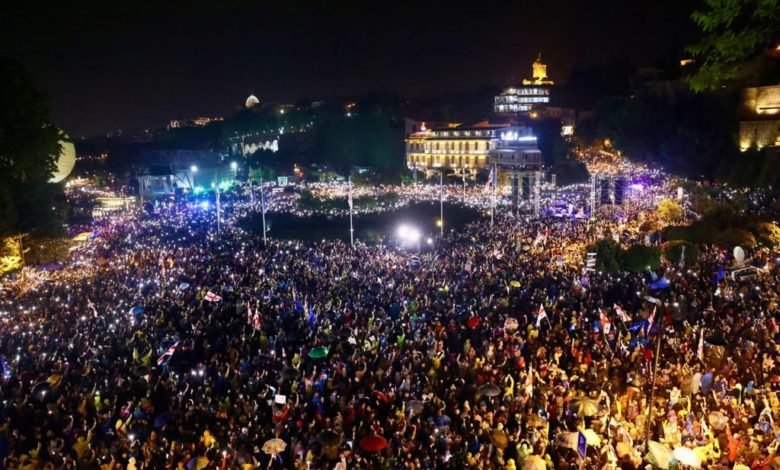
International CSOs Call on European Leaders to Take Action Against GD Government Over ‘Russian Law’
On May 13, the day before the Georgian Parliament votes on the notorious foreign agents law, 55 international human rights organizations, civil society groups and election observers issued a joint statement calling on European and national leaders to “promptly address” the ruling Georgian Dream government’s attempt to “crackdown on civil society” ahead of October’s parliamentary elections. The statement released by the European Platform for Democratic Elections/EPDE reads: “Urgent and decisive international political support for the Georgian civil society is crucial to defend Georgian democracy from Russian-style authoritarianism,” the CSOs say.
Highlighting a “striking resemblance” between the GD-backed “law on transparency of foreign influence” and similar legislation passed in Russia in 2012, the CSOs say this law “threatens to equip the government with tools to suppress civil society and independent media.” The law takes Georgia off the EU path, the CSOs also note. “Russian inspired “Foreign Influence” law is an instrument to crackdown on civil society and independent media,” the CSOs say, noting that increasingly repressive amendments to the law have completely wiped out independent media and civil society activity in Russia.
They also say that if passed, the law would give the GD government “a significant means to greatly restrict citizen oversight of the electoral process, something never seen before to this extent,” ahead of crucial parliamentary elections in October.
Recalling the massive protests against the law, the civil society organizations also stress that the Georgian authorities used “unprecedented violence” to suppress peaceful protests and that it “emphasizes the critical need for the international community to support the Georgian people.”
The CSOs are calling on:
- EU Heads of States and Government to “acknowledge the urgency of the matter as once the legislation is passsed the deteritoration of civil society and electoral integrity may accelerate severely”;
- EU to “urge Georgian government to investigate recent cases of pressure and harassment against citizen election observers and human rights defenders in the country”;
- EU member states and their representatives in Georgia to “show solidarity with the Georgian people who took to the streets in defense of their democratic rights and European future”‘;
- President of the European Council Charles Michel, President of the European Commission Ursula von der Leyen, HR/VP Joseph Borrel and the diplomatic community in Georgia to “show presence on the streets of Georgia in solidarity with the Georgian people.”
If the law is adopted, the CSOs also call on the European institutions to take into account the following recommendations:
- The European Commission should put on hold Georgia’s EU integration process which requires the government in Tbilisi to fulfill the nine steps set out by the European Commission which include ensuring a free, fair and competitive electoral process;
- The European Commission should follow the European Parliament’s resolution of 25 April 2024 and introduce restrictive measures such as travel ban and asset freeze against Georgian oligarch Bidzina Ivanishvili for his role in the deterioration of the political process in Georgia, as well as sanctions against those responsible for the violent crackdown on peaceful protestors;
- The European Commission should suspend budget support to Georgia and financing of government-led projects;
- European Institutions increase financial support and explore alternative ways of supporting Georgian civil society and democratic movements, including through the European Endowment for Democracy;
- The EU and its Member States should support a large-scale and long-term election observation effort both through international institutions as the OSCE/ODIHR and domestic observers in the run-up to the parliamentary elections in October.
Despite unprecedented international and domestic opposition to the Russian-style Foreign Agents Law, the ruling party remains determined to push it through. The bill is scheduled to be voted on in its third reading today, May 14 at 12:00.
Also Read:
This post is also available in: ქართული Русский